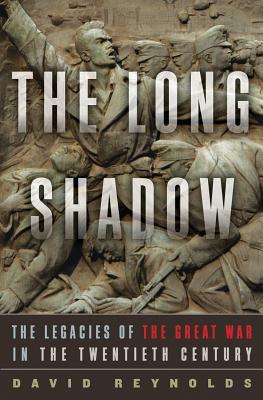I have been reading The Long Shadow: The Legacies of the Great War in the Twentieth Century by David Reynolds. The book is so long and so dense in content that I think I better respond to it bit by bit on this blog.
The book begins with an introduction that reminds the reader about World War I. That war was traumatic to the people of its time, but has faded into (or from) memory a century after it began. Reynolds, a Cambridge professor, demonstrates not only his mastery of history in that introduction, but his ability as a writer -- he provided lovely sentences and paragraphs that succinctly convey the information he wants to bring to the readers attention in preparation for the main content of the boo,
The meat of the book then begins with six chapters in a section labeled "Legacies".
The first of these chapters deals with nationalism. Of course, nationalism was an important driving force in the 19th century as even a brief understanding of German, Italian or Polish history makes clear. (See my post on Polish history and my posts on 1848: post 1, post 2, post 3 and post 4.) However, U.S. President Wilson raised the issue of nationalism in a new and powerful way in the peace treaty negotiations at the end of World War I. Reynolds discusses the new nation-states created following the war (and recognizes that England and France were not going to apply Wilsonian principles to their colonial domains. Check my recent post, written after I had read this chapter, on nationalism.
The next chapter is titled "Democracy". The people of Europe were profoundly angered by the leadership that had produced a world war for little purpose. and which had led soldiers to killing fields of nearly unimaginable horror. The people wanted power and the post war period was marked by the fall of monarchies, (Russia, Germany, Austria-Hungary, the Ottoman empire), the loss of power and influence of aristocracies, and expansion of suffrage (reduction of limitations on male suffrage, women's suffrage) -- in short, a major increase in democracy. It was a hard time, and the political systems evolved under that hardship. The inter-war period saw Bolshevism emerge in the Soviet Union and fascism emerge in Italy and Germany. Reynolds explains how Britain and America -- the victors -- remained democratic, and how the big loser -- Germany -- succumbed to Hitler. Italy, which was one of the allied powers, was especially hard hit by the fighting with Austria, leading to the rise of Mussolini. Reynolds emphasizes that socialism and communism were important political economic movements in all these countries, and shows how liberal democracy triumphed in some countries, while ultra right wing groups won in others. He notes the importance of proportional representation in the outcome; where parliamentary systems allowed PR, parliaments tended to fragment into many small parties requiring complex coalitions to govern -- coalitions that often foundered.
Of course, we continue to live through the evolution of nationalist forces, and the political divide among socialism, liberal democracy, and authoritarian government.

No comments:
Post a Comment